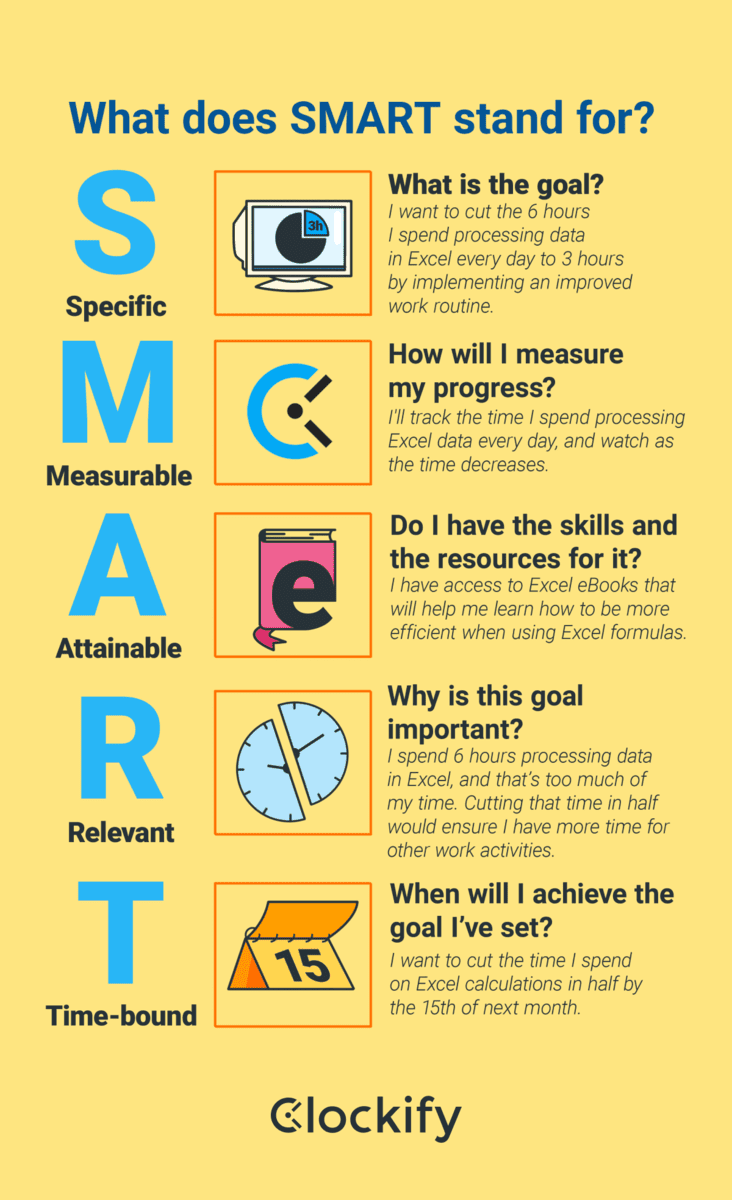Time is precious. Managing it well is essential for success.
Smart goals provide a structured way to enhance time management skills. They are specific, measurable, achievable, relevant, and time-bound, which makes them effective. By setting smart goals, you can prioritize tasks, reduce stress, and achieve more in less time. Imagine feeling in control of your schedule, accomplishing tasks efficiently, and having extra time for yourself.
Smart goals can make this a reality. They help you focus on what’s important and eliminate distractions. With clear objectives, you can track progress and stay motivated. Whether you’re a student juggling assignments or a professional managing projects, smart goals can be your guide. Dive into the world of smart goals and transform how you manage your time.

Credit: clockify.me
Introduction To Smart Goals
Time management is essential in today’s fast-paced world. One effective method is setting smart goals. Smart goals help you allocate time wisely. They make your tasks clear and achievable. Understanding smart goals can transform your approach to time management.
What Are Smart Goals?
Smart goals are specific, measurable, achievable, relevant, and time-bound. Each aspect ensures clarity and focus. Specific goals eliminate ambiguity. Measurable goals track progress. Achievable goals are realistic and attainable. Relevant goals align with personal or professional objectives. Time-bound goals have deadlines to keep you on track.
Importance In Time Management
Smart goals are vital for effective time management. They help prioritize tasks efficiently. With clear goals, you avoid wasting time on unimportant activities. You stay focused on what truly matters. Meeting deadlines becomes easier. Productivity increases as you concentrate on specific objectives. Smart goals offer structure in a busy life.

Credit: efficiencyandorganization.com
Specific Goals
Setting specific goals is a crucial aspect of effective time management. When your goals are clear and defined, you can focus your energy and resources on what truly matters. But how do you ensure your goals are specific enough to guide your actions effectively? Let’s dive into some key elements that make specific goals stand out.
Defining Clear Objectives
Imagine you’re planning to improve your productivity. Simply saying “I want to be more productive” is vague. But saying “I want to complete three tasks each day before lunch” gives you a clear target to aim for. Specific objectives like these create a roadmap for success.
When defining objectives, think about the who, what, where, when, and why. Detail every part of your goal. If your objective is to read more, decide on the number of pages, the book, and the time you’ll read daily. This clarity transforms ideas into action.
Avoiding Ambiguity
Ambiguous goals are like foggy mornings; they obscure the path ahead. If you say, “I want to exercise more,” it leaves room for procrastination. Instead, specify “I will jog for 20 minutes every weekday morning.” This removes doubt and gives you a clear plan.
Think about the last time you set a vague goal. Did it feel achievable? Ambiguity often leads to inaction. By setting specific goals, you reduce uncertainty and increase motivation. Your mind craves direction. Provide it with certainty.
Ask yourself: What exactly do I want to achieve? Break it down into clear, actionable steps. Remember, a well-defined goal is the first step toward effective time management. What specific goals can you set today to take control of your time?
Measurable Outcomes
Setting measurable outcomes in time management is like having a roadmap for your journey. Without clear markers, it’s easy to lose direction and motivation. Imagine working on a project without knowing if you’re getting closer to your goal. You might feel like you’re running in circles. By defining measurable outcomes, you ensure every step you take is purposeful and productive.
Tracking Progress
Tracking progress is crucial to see how far you’ve come and what still needs to be done. Consider using tools like spreadsheets or apps to log your activities. This helps you visualize your progress and make adjustments.
Have you ever felt overwhelmed by tasks? Breaking them down into smaller, trackable parts can ease that feeling. You’ll notice the small victories, which boost your confidence. Monitoring your progress also helps identify patterns. You might find you work better at certain times or need breaks more often.
Setting Milestones
Milestones are like checkpoints on your journey. They help you gauge your progress and motivate you to keep moving. Setting milestones involves breaking down your goal into smaller, achievable parts.
Picture setting a goal to read 30 books in a year. A milestone could be reading 5 books every two months. This approach keeps you on track without feeling overwhelmed by the larger goal.
Do you celebrate your achievements? Marking milestones gives you a reason to celebrate and reflect on your progress. It reinforces your commitment and provides a sense of accomplishment. These celebrations, big or small, can energize you for the next phase.
In time management, measurable outcomes are your guide to success. Are you ready to set your own markers and change the way you manage your time? Start today and watch your productivity soar.

Credit: www.memtime.com
Achievable Targets
Setting achievable targets is crucial for effective time management. These targets ensure you are not overwhelmed while also pushing you to make meaningful progress. Achievable targets are not just about setting goals but setting the right goals. They need to strike a balance between being ambitious and realistic.
Balancing Challenge And Realism
Finding the sweet spot between challenge and realism is key. If your goals are too easy, you might lose interest. If they are too hard, you risk frustration and giving up.
Consider your past experiences. Have you ever set a goal that was out of reach? Reflect on what went wrong. Maybe you underestimated the time needed or overestimated your skills.
Set targets that push you just enough. They should make you feel like you’re stretching yourself, but not to the point of snapping. Ask yourself: Is this goal going to challenge me in a healthy way?
Assessing Resources
Before setting your targets, assess your resources. Do you have the tools, time, and support needed to achieve your goals? Lack of resources can derail even the most well-intentioned plans.
Imagine you’re planning to learn a new language. You need resources like books, apps, and maybe a tutor. Evaluate your budget and time. Can you realistically fit this into your schedule?
Being honest with yourself about what you have can prevent future setbacks. Take a moment to inventory your assets. What do you already have that can help you reach your goals?
Creating achievable targets is a dynamic process. It requires you to continually assess and adjust as you go along. Are you ready to set goals that challenge you and use the resources you have effectively?
Relevant Objectives
Setting relevant objectives is crucial for effective time management. These objectives must align with your goals. They ensure you stay focused and productive. Relevant objectives help you prioritize tasks efficiently. They act as a roadmap for achieving your goals.
Aligning With Priorities
Relevant objectives align with your priorities. They ensure you focus on important tasks. This alignment prevents wasted time on unimportant activities. It’s essential to identify what matters most. Align your objectives to achieve desired outcomes. This approach helps in meeting deadlines and reducing stress.
Ensuring Purpose
Objectives must serve a clear purpose. Each task should contribute to your goals. A purposeful objective keeps you motivated. It provides direction and clarity. Without purpose, you may lose focus. Purposeful objectives help in maintaining momentum.
Time-bound Plans
Creating smart goals boosts time management skills effectively. Set specific, achievable targets with deadlines to stay focused. Break tasks into smaller steps for clarity and efficiency.
Time-bound plans are essential for effective time management. They provide structure and clarity, ensuring goals are met efficiently. When you establish time-bound plans, you create a framework that guides your actions. This framework helps allocate time wisely, preventing procrastination and enhancing productivity. Structured timelines foster a sense of urgency, motivating you to stay focused on your objectives.Setting Deadlines
Deadlines are crucial for time management. They set clear endpoints for tasks. Creating deadlines helps prioritize work and maintain focus. They transform vague goals into specific targets. Deadlines also create accountability, encouraging timely completion of tasks. With a clear deadline, you can measure progress easily. This helps identify areas needing improvement and adjust plans accordingly.Time Management Techniques
Effective time management techniques enhance productivity. Techniques like the Pomodoro method break work into intervals. This method promotes concentration and reduces burnout. Scheduling tasks is another useful technique. It allocates time for specific activities, minimizing distractions. Task batching groups similar tasks together, saving time and boosting efficiency. Prioritizing tasks ensures important work gets done first. This reduces stress and helps focus on achieving goals.Benefits Of Smart Goals
Smart goals enhance time management by providing clear targets. They help organize tasks efficiently, saving valuable time. Setting specific goals ensures focus, reducing distractions and boosting productivity.
Setting SMART goals—Specific, Measurable, Achievable, Relevant, and Time-bound—can transform your time management skills. They provide a structured approach to achieving your objectives. But what makes SMART goals so beneficial?Increased Productivity
SMART goals help you work smarter, not harder. By breaking down your tasks into specific, manageable parts, you can tackle them one at a time. This method reduces overwhelm and boosts your output.Imagine having a mountain of work. With a clear plan, you can chip away at it efficiently. Instead of wasting time on unnecessary tasks, you focus on what’s essential.Have you ever noticed how much more you accomplish when your to-do list is clear and concise? That’s the magic of SMART goals—they streamline your efforts, resulting in higher productivity.Enhanced Focus
SMART goals act like a compass, directing your attention to the most critical tasks. They eliminate distractions by providing a clear path forward.Picture this: you’re working on a project, and distractions keep pulling you away. With SMART goals, you have a map to guide you back on track. You know exactly what needs to be done and when.This focus not only saves time but also enhances the quality of your work. You engage more deeply with your tasks, leading to better results. What could you achieve if you concentrated more on your goals?Ultimately, SMART goals empower you to manage your time wisely. They make sure that your efforts lead to meaningful accomplishments. If you haven’t tried setting SMART goals yet, what’s stopping you?Implementing Smart Goals
Setting SMART goals enhances time management by creating clear, achievable targets. This method encourages precise planning and efficient use of time. It helps individuals focus on priorities and track progress effectively.
Implementing SMART goals in your time management strategy can be a game-changer. It’s all about setting Specific, Measurable, Achievable, Relevant, and Time-bound objectives. This approach not only clarifies your priorities but also boosts your productivity.Practical Tips
Start by identifying what truly matters to you. Break your big goals into smaller, actionable tasks. This makes them less overwhelming and more achievable.Use tools like calendars or apps to track your progress. These tools can remind you of deadlines and keep you on track.Set reminders for each task. This helps maintain focus and ensures you don’t miss important deadlines.Overcoming Common Challenges
Sticking to SMART goals can be tough. You might face distractions or feel demotivated. Recognize these challenges early and find ways to tackle them.If you find yourself procrastinating, ask yourself why. Is the task too big? Break it down further.Celebrate small wins. Each step forward is progress, and recognizing it can boost your motivation.Have you ever set a goal and not followed through? Think about what stopped you. Understanding past failures can help you avoid them in the future.By implementing SMART goals, you can transform your approach to time management. Start today and see the difference it makes in your daily life.Tools For Managing Time
Managing time efficiently is crucial for achieving Smart Goals. Whether you aim to enhance productivity or reduce stress, choosing the right tools can make a significant difference. From digital apps to traditional methods, various options help organize tasks and track progress. Let’s explore these tools for effective time management.
Digital Tools And Apps
Digital tools offer dynamic ways to manage time. Apps like Todoist and Trello streamline task management. They allow you to set priorities and deadlines. Reminders keep you focused and on track. Use calendar apps to plan your day effectively. Google Calendar provides easy scheduling options. Sync it across devices for seamless access. Time tracking apps like Toggl help monitor how you spend hours. This can improve efficiency and identify time-wasting activities. Digital tools are accessible and provide real-time updates.
Traditional Methods
Traditional methods remain reliable for time management. A simple paper planner helps organize tasks. Writing down goals can reinforce commitment. Use sticky notes for quick reminders and ideas. A physical calendar can visualize your monthly schedule. Cross off tasks as you complete them to feel accomplished. Lists are straightforward and keep your mind focused. Set a timer for tasks to limit distractions. Traditional tools are tangible and offer a break from screens.
Frequently Asked Questions
What Is An Example Of A Smart Goal For Time Management?
Set a SMART goal to allocate 30 minutes daily for planning tasks. This improves productivity by organizing priorities effectively.
What Is An Example Of A Timely Smart Goal?
A timely SMART goal example: “Increase website traffic by 20% in three months through targeted SEO strategies and content marketing. “
What Is An Example Of A Smart Goal In Management?
A SMART goal in management is: “Increase team productivity by 20% within six months by implementing new software and conducting monthly training sessions. ” This goal is Specific, Measurable, Achievable, Relevant, and Time-bound, ensuring clear direction and accountability.
What Are The Goals Of Time Management?
Time management aims to boost productivity, reduce stress, and improve efficiency. It helps prioritize tasks effectively and achieve goals promptly. Proper time management enhances focus, facilitates better planning, and fosters work-life balance. Efficiently managing time contributes to greater success and personal satisfaction.
Conclusion
Setting smart goals makes time management more effective. Break tasks into smaller steps. Stay focused and organized. This approach helps you achieve your objectives. Less stress, more productivity. Remember to review your progress regularly. Adjust goals when necessary. Celebrate small victories along the way.
Consistent effort leads to success. Practice these strategies daily. Build better habits over time. Smart goals guide you toward a balanced life. Keep pushing forward. Embrace the power of smart goal setting. Your time is valuable. Use it wisely.










